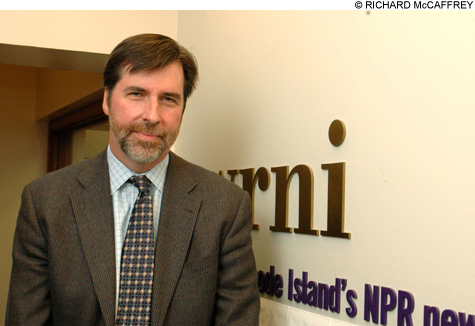
INVESTING IN INFORMATION O’Connor took a real risk when he hired “more of a newsroom than I could reasonably afford.”
|
Rhode Island’s upstart National Public Radio affiliate, WRNI, aims to be nothing less than a major media player here. And in the space of just a couple of years, the station has taken some impressive first steps.
Long a glorified repeater station for its erstwhile owner, Boston public radio powerhouse WBUR, the outlet has lately gained independence, beefed up its newsroom, and watched its ratings surge by more than one-third to almost 70,000 listeners per week.
But reaching for the throne is a tricky business. Witness the recent friction with the state’s wounded, but still reigning media king, the Providence Journal.
WRNI, like many other public-radio outlets across the country, has attempted to forge a partnership with the dominant paper in the region: inviting reporters and columnists on the air to discuss work of particular interest.
And the ProJo has, from time to time, leant out its talent. But there was hope, at the station, for something more.
Historically, the Journal has been reluctant to partner with competitors, even when they seemed to pose little threat. But in an era of declining circulation and plummeting advertising revenue, old-school media outlets across the country have built unprecedented alliances in a bid to stay relevant. Not here.
ProJo sources say the paper’s decision is partly strategic. The top brass — pointing to the paper’s still-dominant position and, perhaps, clinging to some the imperiousness of a bygone era — maintain that, even in the new environment, there is little benefit to a partnership.
WRNI officials say that when the station’s health reporter Megan Hall and ProJo health reporter Felice Freyer recently proposed a radio show that aimed at explaining complex health care issues in easy-to-understand language — a la NPR’s highly regarded “Planet Money” report on economics — the ProJo’s top editors shot it down.
But the tension between the two outlets owes something to a personality conflict, too — this is Rhode Island, after all.
Scott MacKay, a political analyst at WRNI, worked at the Journal for 24 years as a reporter and clashed with some of the paper’s top editors from time to time. Relations soured further as M. Charles Bakst, the paper’s longtime political columnist, prepared to leave the paper.
MacKay — the heir apparent for Bakst’s post — was miffed when the ProJo gave him just a brief tryout as columnist before pulling the plug. He says he never got a full explanation for the decision.
And in the fall of 2008, upset by the column decision and the ProJo’s shrunken appetite for regional political coverage, he decided to take a buyout offered to the entire newsroom.
Two years later the tension remains. MacKay has beaten the ProJo to several stories from his perch at WRNI. And he has offered sharp criticism of the paper in his blog on occasion — much of it on point and some of it, ProJo newsroom sources argue, overly harsh.